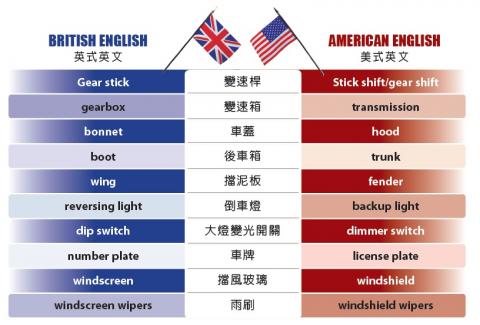For the last article in this American & British English series, we turn to a vocabulary set that evolved after America achieved independence from the UK, and as such has many differences: motor vehicle parts.
In American English, the fender frames the wheel well, preventing mud or rocks being thrown up by the rapidly turning tire. It is the source of the term “fender bender,” meaning a minor accident. In British English, the fender is called the “wing.”
In the UK, before cars were invented, one main form of transport was the horse-drawn carriage. The driver would store his boots in the “boot locker,” and over time this phrase would be shortened to the “boot.” In the US in the past, the main storage space was a trunk attached to the back of the car. Over time, storage space was integrated into the back of the car, and became known as the trunk. In British English, this space is called the “boot.”

The metal part covering the engine is named after soft coverings for the head: “hood” in American English, from the Old English word hod, related to the Dutch hoed (hat), and “bonnet” in British English, from the Old French word bonet (cloth used as a headdress).
(Paul Cooper, Taipei Times)
在「美式英文與英式英文」的最後一個單元,我們要介紹一組詞彙:汽車零件。這些詞彙是在美國脫離英國獨立後演變而來的,因此有許多差異。
在美式英文中,「fender」(擋泥板)包住了輪艙(wheel well),防止快速旋轉的輪胎讓泥沙或石子飛濺出來。它是「fender bender」一詞的來源,表示擦撞、小車禍事故。英式英文則稱擋泥板為「wing」。
在英國,汽車尚未發明時的主要運輸工具是馬車。駕車的人將其靴子放在靴子櫃(boot locker)中,久而久之,該片語縮短為「boot」。過去美國的汽車,其主要置物空間是裝在車子後面的大行李箱(trunk)。後來,置物空間被整合到汽車的後部,並稱為「trunk」(後車箱)。英式英文則稱後車箱為「boot」。
金屬製的引擎蓋,其美式英文名稱卻是來自柔軟的衣物──風帽(hood),源於古英語字「hod」,與荷蘭文「hoed」(帽子)有關。引擎蓋在英式英文中稱為「bonnet」,源自古法語字「bonet」(用作頭巾的布)。
(台北時報林俐凱譯)

The Dutch introduced the Indian mango (Mangifera indica) to Taiwan in the 17th century. It is a green-skinned mango with thick fibers that get stuck in the teeth, but it boasts a rich aroma and a unique taste. In 1954, Taiwan’s Council of Agriculture introduced several mango cultivars from Florida, USA, including the Irwin, Haden, and Keitt varieties. After seven years of testing and domestication, the Irwin variety was chosen for promotion. Years later, the sample saplings started to bear fruit. These mangoes were large, with thin, vibrant red peels and golden pulp. The Irwin mangoes were mouth-wateringly sweet and

對話 Dialogue 清清:今天中午我要多吃一點,不然晚上可能會吃不飽。 Q?ngqing: J?nti?n zh?ngw? w? yao du? ch? yidi?n, buran w?nshang k?neng hui ch?bub?o. 華華:怎麼了?為什麼會吃不飽? Huahua: Z?nmele? Weishenme hui ch?bub?o? 清清:今天大年初七,是「人日節」,傳統上結了婚的女兒要回家給父母送長壽麵,而且最好是素的,我姐姐會回來,只吃素麵,我應該很快就餓了。 Q?ngqing: J?nti?n Danian ch?q?, shi “Renri jie,” chuant?ng shang jiele h?n de n?’er yao huiji? g?i fum? song changshoumian, erqi? zuih?o shi su de, w? ji?jie hui huilai, zh? ch? sumian, w? y?ngg?i h?n kuai jiu ele. 華華:我還是第一次聽說有「人日節」呢!這是怎麼來的啊? Huahua: W? haishi di y? ci t?ngshu? y?u “Renri jie” ne! Zhe shi z?nme lai de a? 清清:老一輩的人說,女媧是在第七天造出了「人」,所以今天可說是我們每個人的「生日」呢!生日快樂! Q?ngqing: L?oyibei de ren shu?, N?w? shi zai di q? ti?n zao ch?le “ren,” su?y? j?nti?n k?shu?shi w?men m?i ge ren de “sh?ngri” ne! Sh?ngri kuaile! 華華:你也是啊!欸?那前六天女媧都做了什麼呢? Huahua: N? y?shi a! Ei? Na